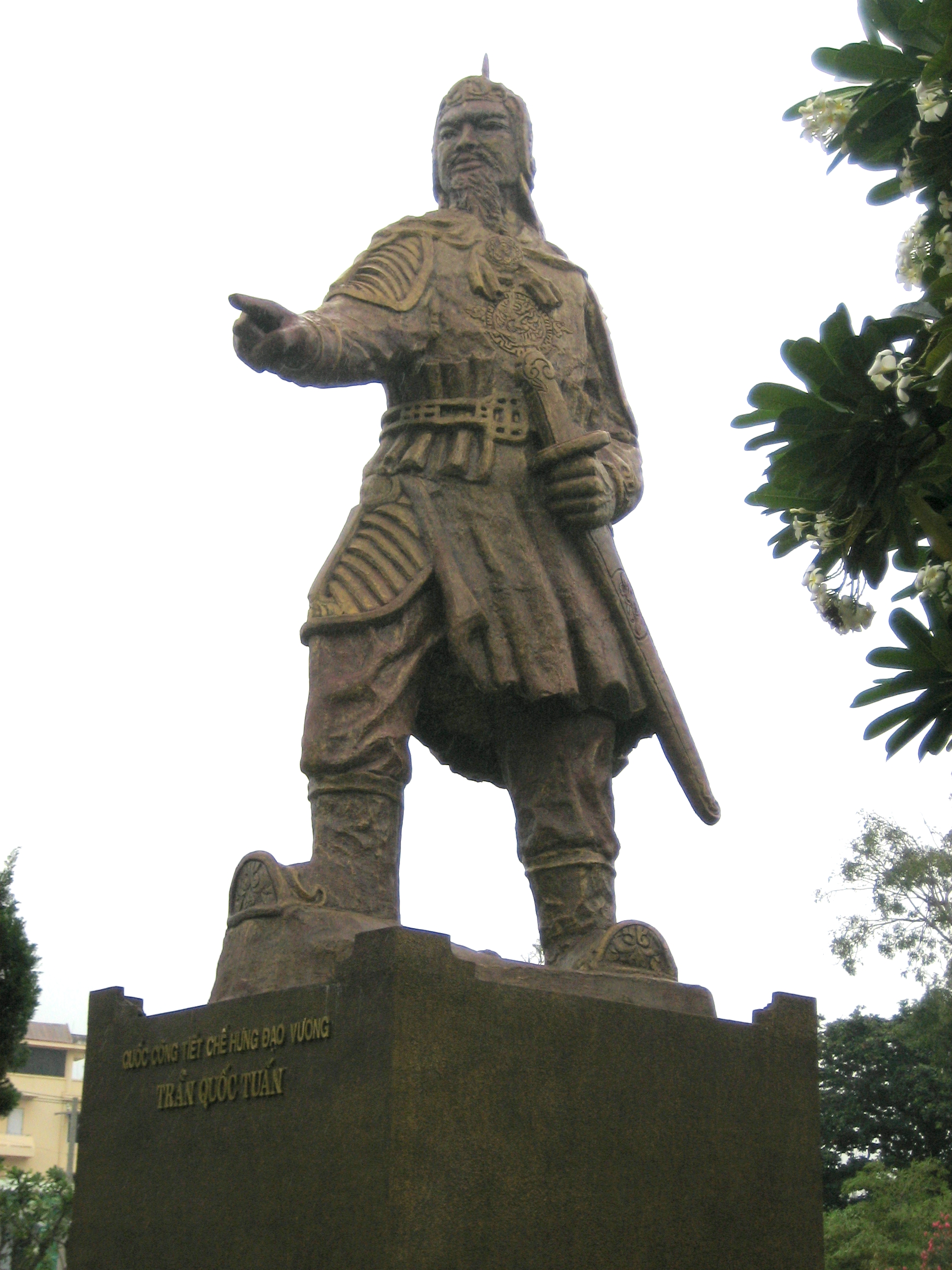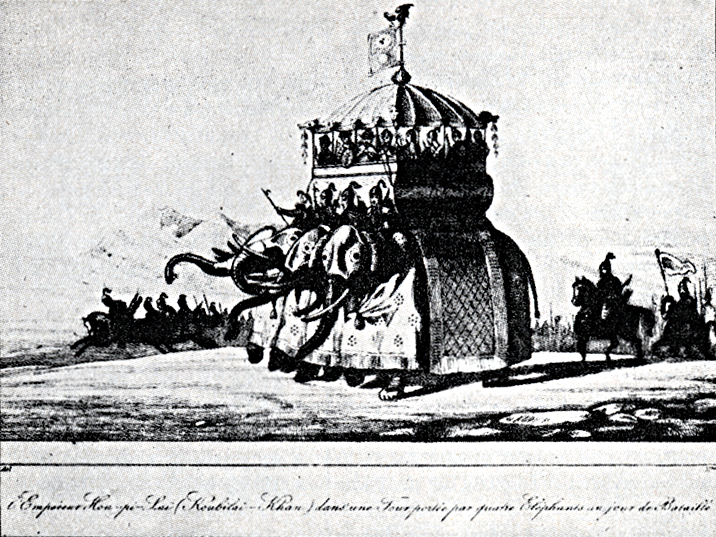|
Toghon (son Of Kublai)
Toghon (died 1301) was the ninth son of Kublai Khan, founder of the Yuan dynasty. He was a commander of the Mongol forces in the Mongol invasions of Vietnam. Biography He was granted the title Prince of Zhennan (鎮南王, , "Prince of Suppressing the South") and moved his household to Ezhou in 1284. In 1285, he led the Mongol armies sent to conquer Champa. He demanded from Đại Việt (now modern Vietnam) a route to Champa, which would trap the Champan army from both north and south, but it was rejected by retired emperor Trần Thánh Tông, who was the ''de facto'' ruler of Đại Việt. As a result, Toghon led an Mongol invasions of Vietnam, invasion of Đại Việt under orders from Kublai Khan. At first he won several victories and captured Thăng Long, the capital of Đại Việt. Trần Thánh Tông had to offer princess An Tư to him to slow down the pace of the Mongol army. Later he ordered a withdrawal back to China, blaming the weather and diseas in Đại Việ ... [...More Info...] [...Related Items...] OR: [Wikipedia] [Google] [Baidu] |
Yangzhou
Yangzhou is a prefecture-level city in central Jiangsu Province, East China. Sitting on the north bank of the Yangtze, it borders the provincial capital Nanjing to the southwest, Huai'an to the north, Yancheng to the northeast, Taizhou, Jiangsu, Taizhou to the east, and Zhenjiang across the river to the south. Its population was 4,559,797 at the 2020 Chinese census, 2020 census and its urban area is home to 2,635,435 inhabitants, including three urban districts, currently in the agglomeration. Historically, Yangzhou was one of the wealthiest cities in China, known at various periods for its great merchant families, poets, artists, and scholars. Its name (lit. "Rising Prefecture") refers to its former position as the capital of the ancient Yangzhou (ancient China), Yangzhou prefecture in Administration of territory in dynastic China, imperial China. Yangzhou was one of the first cities to benefit from one of the earliest World Bank loans in China, used to construct Yangzhou therma ... [...More Info...] [...Related Items...] OR: [Wikipedia] [Google] [Baidu] |
Trần Hưng Đạo
Trần Hưng Đạo (; 1228–1300), real name Trần Quốc Tuấn (陳國峻), also known as Grand Prince Hưng Đạo (''Hưng Đạo Đại Vương'' – 興道大王), was a Vietnamese royal prince, statesman and military commander of Đại Việt military forces during the Trần dynasty. After his death, he was considered a saint and deified by the people and named Đức Thánh Trần (德聖陳) or Cửu Thiên Vũ Đế (九天武帝). Hưng Đạo commanded the Vietnamese armies that repelled two out of three major Mongol invasions in the late 13th century. His multiple victories over the Yuan dynasty under Kublai Khan are considered among the greatest military feats in Vietnamese history. Origins Trần Hưng Đạo was born as Prince Trần Quốc Tuấn ( 陳 國 峻) in 1228, as a son of Prince Trần Liễu, the elder brother of the new child emperor, Trần Thái Tông, after the Trần dynasty replaced the Lý family in 1225 AD. Later, Trần Liễu—t ... [...More Info...] [...Related Items...] OR: [Wikipedia] [Google] [Baidu] |
Generals Of The Mongol Empire
A general officer is an officer of high rank in the armies, and in some nations' air and space forces, marines or naval infantry. In some usages, the term "general officer" refers to a rank above colonel."general, adj. and n.". OED Online. March 2021. Oxford University Press. https://www.oed.com/view/Entry/77489?rskey=dCKrg4&result=1 (accessed May 11, 2021) The adjective ''general'' had been affixed to officer designations since the late medieval period to indicate relative superiority or an extended jurisdiction. French Revolutionary system Arab system Other variations Other nomenclatures for general officers include the titles and ranks: * Adjutant general * Commandant-general * Inspector general * General-in-chief * General of the Air Force (USAF only) * General of the Armies of the United States (of America), a title created for General John J. Pershing, and subsequently granted posthumously to George Washington and Ulysses S. Grant * (" general admiral" ... [...More Info...] [...Related Items...] OR: [Wikipedia] [Google] [Baidu] |
1301 Deaths
Year 1301 (Roman numerals, MCCCI) was a common year starting on Sunday of the Julian calendar. Events January– March * January 14 – With the death of King Andrew III of Hungary, Andrew III ("Andrew the Venetian") after a short illness, possibly from poisoning, the Árpád dynasty, Árpád Dynasty in Kingdom of Hungary (1000–1301), Hungary ends. This results in a power struggle between Wenceslaus III of Bohemia, Otto III, Duke of Bavaria, Otto III of Bavaria, and Charles I of Hungary, Charles Robert of Naples. Eventually, Wenceslaus is elected and crowned as king of Hungary and Croatia in personal union with Hungary, Croatia. His rule is only nominal, because a Oligarch (Kingdom of Hungary), dozen powerful Hungarian nobles hold sway over large territories in the kingdom. * January 25 – Second Mongol invasion of Burma: The forces of Temür Khan, Mongol leader who also serves as the Emperor Chengzong of China, reach Myinsaing, capital of the Myinsaing Kingdom ... [...More Info...] [...Related Items...] OR: [Wikipedia] [Google] [Baidu] |
History Of Yuan
The ''History of Yuan'' (), also known as the ''Yuanshi'', is one of the official Chinese historical works known as the '' Twenty-Four Histories'' of China. Commissioned by the court of the Ming dynasty, in accordance to political tradition, the text was composed in 1370 by the official Bureau of History of the Ming dynasty, under direction of Song Lian (1310–1381). The compilation formalized the official history of the preceding Yuan dynasty. Under the guidance of Song Lian, the official dynastic history broke with the old Confucian historiographical tradition, establishing a new historical framework asserting that the influence of history was equal in influence to the great Confucian classics in determining the course of human affairs. Layout and contents The historical work consists of 210 chapters chronicling the history of the Yuan dynasty from the time of Genghis Khan (c. 1162–1227) to the flight of the last Yuan emperor, Toghon Temür ("Emperor Huizong", 1333– ... [...More Info...] [...Related Items...] OR: [Wikipedia] [Google] [Baidu] |
Xin Yuanshi
Xin may refer to: *Xin dynasty (), which ruled China from 9–23 AD *Xincan languages (ISO 639: xin), a small extinct family of Mesoamerican languages People *Xin (surname), Chinese surname * Empress Xin (Zhang Zuo's wife) (; died ), wife of the Chinese state Former Liang's ruler Zhang Zuo * Noble Consort Xin (1737–1764), consort of the Qianlong Emperor *Yue Xin (activist) (born 1996), Chinese student activist Philosophy * Xin (heart-mind), 心 * Xin (virtue), 信, one of the Three Fundamental Bonds and Five Constant Virtues Places *Xinjiang Uyghur Autonomous Region, abbreviated as Xin, the northwestern region of China *Xin County, Xinyang, Henan, China *Xin River, a tributary to Poyang Lake in Jiangxi Province Popular culture * ''Xin'' (comics), a comic book by Kevin Lau, or its main character *Xin, the "Ember Spirit", a character in ''Defense of the Ancients'' and ''Dota 2'' *"Xin", an episode of ''The Good Doctor'' Other uses * .xin, a top-level internet domain, ope ... [...More Info...] [...Related Items...] OR: [Wikipedia] [Google] [Baidu] |
Battle Of Bạch Đằng (1288)
The Battle of Bạch Đằng was a decisive naval battle during the third Mongol invasion of Vietnam between Đại Việt commanded by Commander-in-Chief Prince Trần Quốc Tuấn (Prince Hưng Đạo), and the fleet of the Yuan dynasty, commanded by Admirals Omar and Fan Yi on the Bạch Đằng River (today Quảng Ninh province), which Prince Hưng Đạo staged an ambush that destroyed the Yuan fleet, capturing its general, ending Kublai’s intention to conquer Dai Viet and Champa. The battle was a tactical masterpiece of the same stature as a previous battle of Bạch Đằng that occurred in 938 and is considered as one of the greatest victories in Vietnamese military history. Background Omar bin Nars al-Din 'Umar al-Bukhari, son of Mongol appointed Khwarezmian governor of Yunnan Nasr al-Din, was a highly reputed and skillful naval commander of the Mongol Yuan army during Kublai's conquest of the Song dynasty, in which he commanded the leading fleet to assist ... [...More Info...] [...Related Items...] OR: [Wikipedia] [Google] [Baidu] |
Trần Dynasty
The Trần dynasty (Vietnamese language, Vietnamese: Nhà Trần, chữ Nôm: 茹陳; Vietnamese language, Vietnamese: triều Trần, chữ Hán: [wikt:朝]wikt:陳, 朝wikt:陳, 陳), officially Đại Việt (Chữ Hán: 大越), was a List of Vietnamese dynasties, Vietnamese dynasty that ruled from 1225 to 1400. The dynasty was founded when emperor Trần Thái Tông ascended to the throne after his uncle Trần Thủ Độ orchestrated the overthrow of the Lý dynasty. The Trần dynasty defeated three Mongol invasions of Vietnam, Mongol invasions, most notably during the decisive Battle of Bạch Đằng (1288), Battle of Bạch Đằng River in 1288. The final emperor of the dynasty was Trần Thiếu Đế, Thiếu Đế, who was forced to abdicate the throne in 1400, at the age of five years old in favor of his maternal grandfather, Hồ Quý Ly. The Trần improved Chinese gunpowder, enabling them to Nam tiến, expand southward to defeat and vassalize the Champa. The ... [...More Info...] [...Related Items...] OR: [Wikipedia] [Google] [Baidu] |
Thăng Long
Hanoi ( ; ; ) is the capital and second-most populous city of Vietnam. The name "Hanoi" translates to "inside the river" (Hanoi is bordered by the Red and Black Rivers). As a municipality, Hanoi consists of 12 urban districts, 17 rural districts, and 1 district-level town. The city encompasses an area of . and as of 2024 has a population of 8,718,000. Hanoi had the second-highest gross regional domestic product of all Vietnamese provinces and municipalities at US$51.4 billion in 2022, behind only Ho Chi Minh City. In the third century BCE, the Cổ Loa Capital Citadel of Âu Lạc was constructed in what is now Hanoi. Âu Lạc then fell under Chinese rule for a thousand years. In 1010, under the Lý dynasty, Vietnamese emperor Lý Thái Tổ established the capital of the imperial Vietnamese nation Đại Việt in modern-day central Hanoi, naming the city Thăng Long ( , 'ascending dragon'). In 1428, King Lê Lợi renamed the city to Đông Kinh ( , 'eastern capit ... [...More Info...] [...Related Items...] OR: [Wikipedia] [Google] [Baidu] |
Kublai Khan
Kublai Khan (23 September 1215 – 18 February 1294), also known by his temple name as the Emperor Shizu of Yuan and his regnal name Setsen Khan, was the founder and first emperor of the Mongol-led Yuan dynasty of China. He proclaimed the dynastic name "Great Yuan" in 1271, and ruled Yuan China until his death in 1294. Kublai was the second son of Tolui by his chief wife Sorghaghtani Beki, and a grandson of Genghis Khan. He was almost 12 when Genghis Khan died in 1227. He had succeeded his older brother Möngke as Khagan in 1260, but had to defeat his younger brother Ariq Böke in the Toluid Civil War lasting until 1264. This episode marked the beginning of the division of the Mongol Empire. Kublai's real power was limited to the Yuan Empire, even though as Khagan he still influenced the Ilkhanate and, to a significantly lesser degree, the Golden Horde. In 1271, Kublai established the Yuan dynasty and formally claimed orthodox succession from prior Chinese dynasties. ... [...More Info...] [...Related Items...] OR: [Wikipedia] [Google] [Baidu] |






